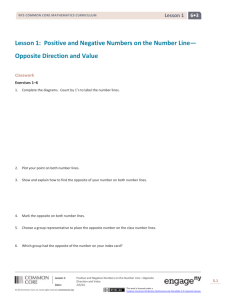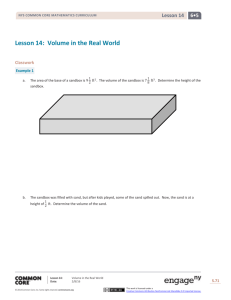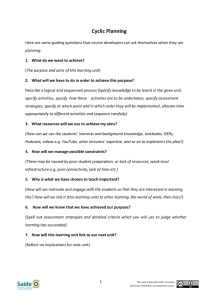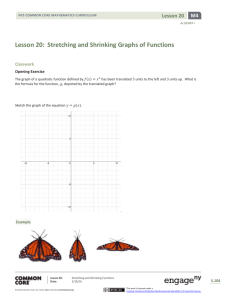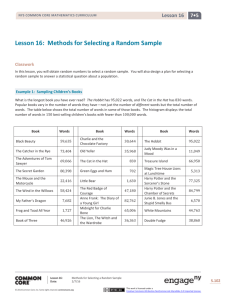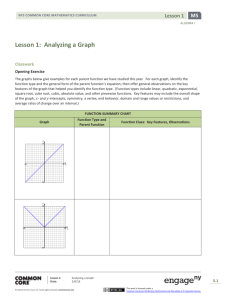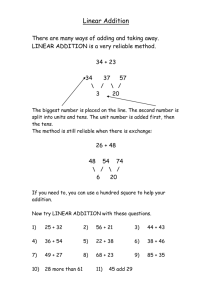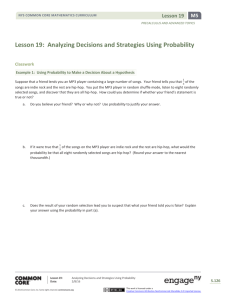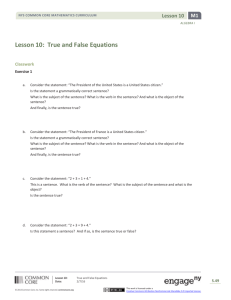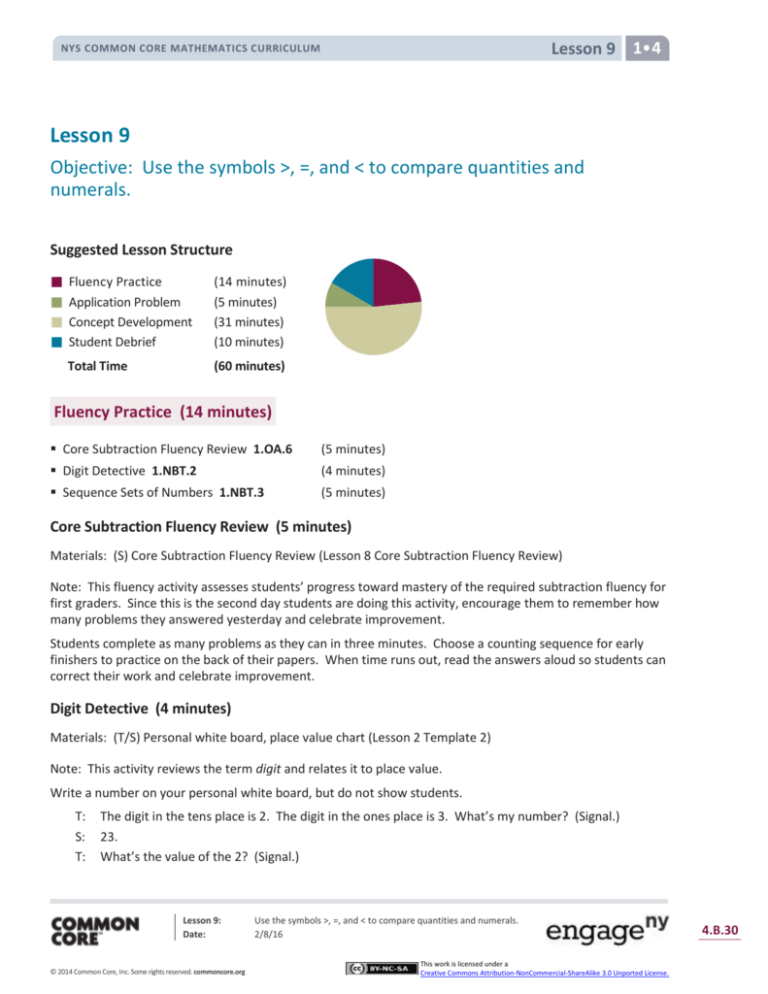
Lesson 9 1•4
NYS COMMON CORE MATHEMATICS CURRICULUM
Lesson 9
Objective: Use the symbols >, =, and < to compare quantities and
numerals.
Suggested Lesson Structure
Fluency Practice
Application Problem
Concept Development
Student Debrief
Total Time
(14 minutes)
(5 minutes)
(31 minutes)
(10 minutes)
(60 minutes)
Fluency Practice (14 minutes)
Core Subtraction Fluency Review 1.OA.6
(5 minutes)
Digit Detective 1.NBT.2
(4 minutes)
Sequence Sets of Numbers 1.NBT.3
(5 minutes)
Core Subtraction Fluency Review (5 minutes)
Materials: (S) Core Subtraction Fluency Review (Lesson 8 Core Subtraction Fluency Review)
Note: This fluency activity assesses students’ progress toward mastery of the required subtraction fluency for
first graders. Since this is the second day students are doing this activity, encourage them to remember how
many problems they answered yesterday and celebrate improvement.
Students complete as many problems as they can in three minutes. Choose a counting sequence for early
finishers to practice on the back of their papers. When time runs out, read the answers aloud so students can
correct their work and celebrate improvement.
Digit Detective (4 minutes)
Materials: (T/S) Personal white board, place value chart (Lesson 2 Template 2)
Note: This activity reviews the term digit and relates it to place value.
Write a number on your personal white board, but do not show students.
T:
S:
T:
The digit in the tens place is 2. The digit in the ones place is 3. What’s my number? (Signal.)
23.
What’s the value of the 2? (Signal.)
Lesson 9:
Date:
© 2014 Common Core, Inc. Some rights reserved. commoncore.org
Use the symbols >, =, and < to compare quantities and numerals.
2/8/16
This work is licensed under a
Creative Commons Attribution-NonCommercial-ShareAlike 3.0 Unported License.
4.B.30
Lesson 9 1•4
NYS COMMON CORE MATHEMATICS CURRICULUM
S:
T:
S:
20.
What’s the value of the 3? (Signal.)
3.
Repeat sequence with a ones digit of 1 and a tens digit of 3.
T:
S:
T:
S:
The digit in the tens place is 1 more than 2. The digit in the ones place is 1 less than 2. What’s my
number? (Signal.)
31.
The digit in the ones place is equal to 8 – 4. The digit in the tens place is equal to 9 – 7. What’s my
number? (Signal.)
24.
As with the above example, begin with easy clues and gradually increase the complexity. Give students the
option to write the digits on their place value chart as you say the clues.
Sequence Sets of Numbers (5 minutes)
Materials: (S) Personal white board
Note: This activity reviews yesterday’s lesson.
Write sets of four numbers within 40 (e.g., 23, 13, 32, 22). Students write and read the numbers from least to
greatest, then from greatest to least. Ask questions such as the following:
How could you use the words greater than or less than to compare 32 and 23?
Which number has the same digit in the tens place and ones place?
Which two numbers have the same digit in the tens place?
Which two numbers have the same digit in the ones place?
Which number is less than 23?
Continue with similar questions and different sets of numbers.
Suggested sets: 13, 11, 31, 1; 17, 27, 21, 12; 38, 18, 25, 35; etc.
Application Problem (5 minutes)
Carl has a collection of rocks. He collects 10 more rocks.
Now he has 31 rocks. How many rocks did he have in
the beginning?
a. Use place value charts to show how many rocks
Carl had at the beginning.
b. Write a statement comparing how many rocks Carl started and ended with, using one of these
phrases: greater than, less than, or equal to.
Note: In this add to with start unknown problem, students are asked to mentally determine what number is
10 less than 31. For students who struggle, a place value chart and/or manipulatives would be helpful.
Lesson 9:
Date:
© 2014 Common Core, Inc. Some rights reserved. commoncore.org
Use the symbols >, =, and < to compare quantities and numerals.
2/8/16
This work is licensed under a
Creative Commons Attribution-NonCommercial-ShareAlike 3.0 Unported License.
4.B.31
Lesson 9 1•4
NYS COMMON CORE MATHEMATICS CURRICULUM
Concept Development (31 minutes)
Materials: (T) Double-sided alligator card (Template),
comparison cards (Lesson 8 Template)
(S) Comparison cards (Lesson 8 Template), personal
white board
Note: When comparing numbers, most students tend to
express the comparison by starting with the greater number,
regardless of the order of the numbers on the page. For
instance, if the numbers 3 and 30 were displayed on the board,
students may say 30 is greater than 3. The statement is true,
even though the student was not comparing from left to right.
The best support we can give students is to affirm their true
remark, and ask them to now compare the numbers starting
with the one on the left, pointing to the 3. Examples of this are
embedded in the dialogue below.
NOTES ON
MULTIPLE MEANS
OF EXPRESSION:
English language learners may benefit
from having sentence frames to refer
to, on the board or in their personal
white boards, as they read comparison
statements from left to right.
_____ is greater than _____.
_____ is less than _____.
As they become more familiar with
reading the statement, remove the
sentence frame.
Gather students in the meeting area with their materials.
T:
S:
T:
S:
T:
S:
T:
S:
T:
S:
T:
S:
T:
T:
(Project or draw a group of 2 fish and a group of 10 fish with enough room in between the groups to
place the alligator picture.) Here is an alligator. He is really hungry. Notice his open mouth. (Trace
the shape of the mouth with your finger.) Would this hungry alligator rather eat 2 fish or 10 fish for
dinner?
10 fish!
Why would he rather eat the group of 10 fish?
10 fish is more than 2 fish! 10 is greater than 2.
Yes, terrific. What would we say if we started comparing the numbers from the left, starting with
the number 2?
2 is less than 10. (Place Alligator A between the fish, showing the alligator facing the group of 10
fish.)
(Project or draw a group of 15 fish and a group of 10 fish in the same manner.) Which group of fish
will the hungry alligator want to eat this time?
The group of 15 fish!
Why?
15 fish is greater than 10 fish.
Show or explain how you know that.
15 is made of 1 ten and 5 ones. That’s more than just 1 ten. I can show it with my ten-sticks!
See? 1 ten and 5 ones is more than 1 ten.
(Draw a number bond under 15 to show 10 and 5. Turn the card over to Alligator B to show the
alligator facing the 15 fish.)
Now, I will post only numbers. We’ll continue to compare them and decide which number the
alligator would prefer.
Lesson 9:
Date:
© 2014 Common Core, Inc. Some rights reserved. commoncore.org
Use the symbols >, =, and < to compare quantities and numerals.
2/8/16
This work is licensed under a
Creative Commons Attribution-NonCommercial-ShareAlike 3.0 Unported License.
4.B.32
Lesson 9 1•4
NYS COMMON CORE MATHEMATICS CURRICULUM
Repeat the process from above with the following suggested sequence of numbers:
1 ten and 1 ten 6 ones
30 and 20
4 tens and 3 tens 8 ones
39 and 32
14 and 40
23 and 32
When appropriate, you may want to use the alligator cards to cover up the words greater than and less than
to encourage students to rely on using just the symbols.
With each pair of numbers, encourage students to explain their reasoning. Ask the students to express each
MP.7 number in tens and ones, comparing the tens and the ones in each number as they explain why one number
is greater than or less than the other number.
T:
S:
T:
Now, it’s your turn to do this with a partner. Take out your comparison cards. Hold up the card that
says less than.
(Hold up less than card, showing the words.)
Turn the card over. The wavy water lines should be at the bottom of your
card. You will see a part of the alligator’s mouth. If you’d like, use a yellow
colored pencil to add some teeth to your alligator’s mouth. (Demonstrate by
adding teeth on the teacher comparison card. In tomorrow’s lesson,
students will erase teeth.)
Repeat this process for the greater than card.
T:
T:
Now, we’re ready to play Compare It!
Each of you will write a number from 0 to 40 on your
personal white board, without showing your partner.
When you are both ready, put them down next to each
other. For the first round, Partner A uses her
comparison cards to put the alligator picture between
the boards, always having the alligator’s mouth open
to the greater number. Then, Partner B will read the
expression from left to right. Each round will last one
minute. The object of the game is to see how many
different comparisons you can make within each
round. You can use tally marks to keep track.
NOTES ON
MULTIPLE MEANS
OF ACTION AND
EXPRESSION:
As students are completing their
Problem Set, encourage them to
quietly read each expression as they
circle their answer. This will allow the
teacher to hear which students are
reading the expressions correctly and
support those who may need it.
At the end of the first round, have partners use Partner B’s comparison cards. Alternate for each round until
the students have played for four minutes. During that time, circulate and notice which students are
successful and which may need more support. Encourage students to make the game more challenging by
varying how they represent the number, using quick tens, place value charts, and writing the numbers as tens
and ones. Grouping students by readiness levels will facilitate this opportunity to differentiate.
Lesson 9:
Date:
© 2014 Common Core, Inc. Some rights reserved. commoncore.org
Use the symbols >, =, and < to compare quantities and numerals.
2/8/16
This work is licensed under a
Creative Commons Attribution-NonCommercial-ShareAlike 3.0 Unported License.
4.B.33
Lesson 9 1•4
NYS COMMON CORE MATHEMATICS CURRICULUM
Problem Set (10 minutes)
Students should do their personal best to complete the
Problem Set within the allotted 10 minutes. For some
classes, it may be appropriate to modify the assignment by
specifying which problems they work on first.
Student Debrief (10 minutes)
Lesson Objective: Use the symbols >, =, and < to compare
quantities and numerals.
The Student Debrief is intended to invite reflection and
active processing of the total lesson experience.
Invite students to review their solutions for the Problem
Set. They should check work by comparing answers with a
partner before going over answers as a class. Look for
misconceptions or misunderstandings that can be
addressed in the Debrief. Guide students in a
conversation to debrief the Problem Set and process the
lesson.
Any combination of the questions below may be used to
lead the discussion.
Compare your answer to Problem 4(a) with your
partner’s. Did you and your partner come up
with the same answer? Can there be more than
one answer? Are there other problems that can
have more than one answer? Why?
Compare your answer to Problem 4(j) with your
partner’s. Did you and your partner come up
with the same answer? Can there be only one
answer? Are there other problems that can only
have one answer? Why?
What new math symbols did we use today to
compare different numbers? (> for greater than,
< for less than.)
Look at your statement to today’s Application
Problem. Rewrite your statement using only
numbers and a symbol.
Lesson 9:
Date:
© 2014 Common Core, Inc. Some rights reserved. commoncore.org
Use the symbols >, =, and < to compare quantities and numerals.
2/8/16
This work is licensed under a
Creative Commons Attribution-NonCommercial-ShareAlike 3.0 Unported License.
4.B.34
Lesson 9 1•4
NYS COMMON CORE MATHEMATICS CURRICULUM
Exit Ticket (3 minutes)
After the Student Debrief, instruct students to complete the Exit Ticket. A review of their work will help with
assessing students’ understanding of the concepts that were presented in today’s lesson and planning more
effectively for future lessons. The questions may be read aloud to the students.
Lesson 9:
Date:
© 2014 Common Core, Inc. Some rights reserved. commoncore.org
Use the symbols >, =, and < to compare quantities and numerals.
2/8/16
This work is licensed under a
Creative Commons Attribution-NonCommercial-ShareAlike 3.0 Unported License.
4.B.35
Lesson 9 Problem Set 1•4
NYS COMMON CORE MATHEMATICS CURRICULUM
Name
Date
1. Circle the alligator that is eating the greater number.
a.
b.
40
20
c.
10
30
d.
18
14
19
36
2. Write the numbers in the blanks so that the alligator is eating the greater number.
With a partner, compare the numbers out loud, using is greater than, is less than, or
is equal to. Remember to start with the number on the left.
a.
24
______
d.
b.
4
______
20
36
______
e.
2
38
36
c.
14
______
______
f.
35
15
20
______
19
______
______
______
g.
______
h.
31
______
______
13
Lesson 9:
Date:
© 2014 Common Core, Inc. Some rights reserved. commoncore.org
i.
23
______
______
______
32
21
______
______
12
______
Use the symbols >, =, and < to compare quantities and numerals.
2/8/16
This work is licensed under a
Creative Commons Attribution-NonCommercial-ShareAlike 3.0 Unported License.
4.B.36
Lesson 9 Problem Set 1•4
NYS COMMON CORE MATHEMATICS CURRICULUM
3. If the alligator is eating the greater number, circle it. If not, redraw the alligator.
a.
b.
20
32
19
23
4. Complete the charts so that the alligator is eating a greater number.
a.
1
2
b.
1
c.
2 7
2
d.
2
5
5
e.
8
3 8
4
4
2 1
9
1 4
4
f.
2 1
2
2
g.
h.
1
9
8
5
i.
j.
7
2 1
Lesson 9:
Date:
© 2014 Common Core, Inc. Some rights reserved. commoncore.org
Use the symbols >, =, and < to compare quantities and numerals.
2/8/16
This work is licensed under a
Creative Commons Attribution-NonCommercial-ShareAlike 3.0 Unported License.
4.B.37
Lesson 9 Exit Ticket 1•4
NYS COMMON CORE MATHEMATICS CURRICULUM
Name
Date
1. Write the numbers in the blanks so that the alligator is eating the greater number.
Read the number sentence, using is greater than, is less than, or is equal to.
Remember to start with the number on the left.
a.
12
10
______
d.
b.
______
13
22
3
24
______
e.
27
c.
______
17
______
f.
28
25
30
______
21
______
______
______
g.
21
Lesson 9:
Date:
© 2014 Common Core, Inc. Some rights reserved. commoncore.org
i.
31
______
______
______
h.
12
______
______
______
13
32
______
______
23
______
Use the symbols >, =, and < to compare quantities and numerals.
2/8/16
This work is licensed under a
Creative Commons Attribution-NonCommercial-ShareAlike 3.0 Unported License.
4.B.38
Lesson 9 Homework 1•4
NYS COMMON CORE MATHEMATICS CURRICULUM
Name
Date
1. Write the numbers in the blanks so that the alligator is eating the greater number.
Read the number sentence, using is greater than, is less than, or is equal to.
Remember to start with the number on the left.
a.
10
______
d.
b.
20
______
29
______
17
______
e.
30
15
c.
______
______
39
38
______
______
24
22
______
f.
______
39
40
______
______
2. Complete the charts so that the alligator is eating a greater number.
b.
a.
1
1 8
c.
2 4
3
d.
2 3
e.
2
f.
1 7
Lesson 9:
Date:
© 2014 Common Core, Inc. Some rights reserved. commoncore.org
7
Use the symbols >, =, and < to compare quantities and numerals.
2/8/16
This work is licensed under a
Creative Commons Attribution-NonCommercial-ShareAlike 3.0 Unported License.
4.B.39
NYS COMMON CORE MATHEMATICS CURRICULUM
Lesson 9 Homework 1•4
Compare each set of numbers by matching to the correct alligator or phrase to make a
true number sentence. Check your work by reading the sentence from left to right.
3.
16
17
31
23
35
25
12
21
22
32
29
30
39
40
Lesson 9:
Date:
© 2014 Common Core, Inc. Some rights reserved. commoncore.org
is less than
is greater than
than
Use the symbols >, =, and < to compare quantities and numerals.
2/8/16
This work is licensed under a
Creative Commons Attribution-NonCommercial-ShareAlike 3.0 Unported License.
4.B.40
NYS COMMON CORE MATHEMATICS CURRICULUM
Lesson 9 Template 1•4
greater than
double-sided alligator card. Print on cardstock with next page. One copy for teacher only.
Lesson 9:
Date:
© 2014 Common Core, Inc. Some rights reserved. commoncore.org
Use the symbols >, =, and < to compare quantities and numerals.
2/8/16
This work is licensed under a
Creative Commons Attribution-NonCommercial-ShareAlike 3.0 Unported License.
4.B.41
Lesson 9 Template 1•4
NYS COMMON CORE MATHEMATICS CURRICULUM
less than
double-sided alligator card. Print on cardstock with previous page. One copy for teacher only.
Lesson 9:
Date:
© 2014 Common Core, Inc. Some rights reserved. commoncore.org
Use the symbols >, =, and < to compare quantities and numerals.
2/8/16
This work is licensed under a
Creative Commons Attribution-NonCommercial-ShareAlike 3.0 Unported License.
4.B.42

